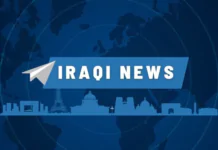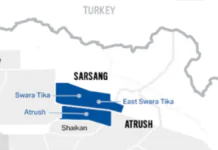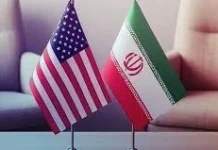Al-Alaq: Electronic Payments In Iraq Are Witnessing Rapid Growth After The Ban On Cash Transactions.
August 7, 2025 Baghdad/Iraq Observer Central Bank Governor Ali Al-Alaq confirmed that
electronic payment transactions in Iraq have witnessed rapid growth, both in the private sector and within government agencies, following the implementation of the decision to ban cash transactions in government institutions at the beginning of July.
Al-Alaq said in a televised statement, followed by the Iraq Observer, that “the bank is cooperating with the Iraqi government to implement the decision issued by the Council of Ministers requiring all state institutions to use electronic payment methods and halt cash transactions, as well as to localize salaries.”
Earlier this year, the Iraqi government set July 2025 as the start date for all government payments to be implemented electronically, prohibiting cash payments through government agencies.
The governor added that the Central Bank of Iraq has completed the development of legislative frameworks, instructions, and controls regulating operations in line with international standards and regulations. He also noted that the digital infrastructure is now ready, noting that payment companies operating in Iraq and civil society organizations are conducting public awareness campaigns.
As a result of these efforts, the number of electronic cards in Iraq has surpassed 25 million, and the
number of point-of-sale (POS) devices has exceeded 5 million, distributed across all Iraqi governorates,
most of them in government departments, according to Haider Al-Omran,
Chairman of the Baghdad Council for Digital Transformation and Electronic Payment.
He urged the private sector to encourage electronic payments and rely more heavily on digital transformation to keep pace with this rapidly evolving trend. https://observeriraq.net/العلاق-الدفع-الإلكتروني-في-العراق-يشه/
Iraq Seeks To Consolidate Its Electronic Payment Infrastructure Through Five Projects.
August 7, 2025 Baghdad / Iraq Observer Central Bank Governor Ali Al-Alaq announced on Thursday the
development of rules and guidelines supporting electronic payments, while also noting efforts to consolidate the electronic payments infrastructure through five projects.
Al-Alaq said at the Comprehensive E-Payment Transformation Conference:
“Digital transformation has become a strategic choice for building a modern state, a diversified economy, and transparent government services.
International experience has proven that digitization is not a luxury, but rather a key driver for
sustainable development,
improving the work environment,
empowering youth, and
developing vital sectors.”
He added, “We are facing a historic opportunity to make up for lost time and embark on a clear vision toward an economy capable of confronting challenges, combating corruption, and creating an environment conducive to investment.”
As part of the drive towards digital transformation and electronic payments, Al-Alaq explained that
“the Central Bank has worked to develop electronic payments in an integrated and secure manner,
including payment and settlement in accordance with the highest international standards and practices.”
He emphasized that “these systems have contributed to enhancing the efficiency and reliability of financial operations and supported the implementation of strategic initiatives in partnership with the government, including salary localization, electronic fortification, and development financing programs.”
He pointed out that “the Central Bank, based on its role in managing monetary policy and
regulating the financial and banking sector, is working within its plan to consolidate the electronic payment infrastructure by implementing a number of national projects.”
He continued, “The most prominent of these projects are:
First, the instant payments system, which
allows for 24-hour financial transfers,
provides users with a seamless experience, and
provides financial institutions with advanced services.
The second project is the unified gateway for payments and government entities, which
facilitates payment procedures, reduces manipulation, and increases trust.”
He continued, “The third project is the National Card Scheme, which builds an independent national system that
preserves digital sovereignty,
reduces reliance on external systems, and
opens the door to products that suit the local market.
The fourth project is developing the national department to
support the significant increase in transaction volume and
ensure the speed and stability of operations within a secure environment.”
He pointed out that “the fifth project is to
establish partnerships with regional and international institutions and
deepen cooperation with global payment networks to benefit from their advanced tools.”
Al-Alaq explained that “these steps are part of a comprehensive national strategy to
reshape the relationship between the state and society,
enhance transparency in service provision, and
achieve a balance between
technological development and
financial stability.”
He pointed out that “work is underway on an in-depth study to regulate trading in crypto assets,
taking into account the challenges, risks, and opportunities, ensuring financial stability requirements, and strengthening systems to combat fraud, money laundering, and terrorist financing.”
He noted that “every 10 % increase in digital payments can contribute to the GDP,
underscoring the importance of transformation in supporting economic growth.”
He emphasized “supporting banks and payment companies in accelerating infrastructure development,
providing reliable communication networks,
encouraging young developers to create applications that comply with security standards, and
supporting technology companies specializing in cybersecurity.”
The Central Bank Governor called on the media and educational institutions to
“launch awareness programs explaining the
benefits of electronic payments and the
risks of dealing outside the official framework, to
build an integrated system characterized by efficiency and transparency,
placing Iraq among the ranks of advanced countries.”
He added, “The success of the digital transformation is not achieved solely through infrastructure, but rather requires a genuine partnership between various stakeholders, including government agencies, the banking sector, technology companies, and civil society organizations.
Raising community awareness of digital payments and alleviating concerns is a crucial element in building trust.” He concluded by saying, “The Central Bank affirms its full commitment to continuing its efforts to promote a secure environment, as we believe that government payments, collection, and electronic fortification are essential gateways to reforming financial management, enhancing transparency, stimulating investment, and expanding the tax base.”
https://observeriraq.net/العراق-يسعى-لترسيخ-البنية-التحتية-للد/
Iraq’s Central Bank Accelerates Digital Financial Reform
Business Iraq Iraqi News August 7, 2025 Iraq’s Central Bank Governor Ali Mohsen Al-Allaq at the E-Payment Transformation Summit in Baghdad. Baghdad (IraqiNews.com) – At the Comprehensive E-Payment Transformation Summit in Baghdad,
Iraq’s Central Bank Governor, Ali Mohsen Al-Allaq,
emphasized the country’s transition to a modern, transparent economy based on digital innovation.
The Central Bank of Iraq has rolled out secure, globally-aligned lectronic payment systems that support initiatives like salary localization, digital ID programs, and development financing.
Key projects underway include an instant payments platform, a unified government payment gateway, and a national card scheme to safeguard digital sovereignty and reduce reliance on foreign systems.
Building on earlier efforts to strengthen cybersecurity across banks,
Al-Allaq also spotlighted a broader reform strategy launched in collaboration with international partners such as the World Bank, Arab Monetary Fund, AFI, and GIZ.
The strategy, covering 2025 to 2029, is aimed at improving Iraq’s financial inclusion, consumer protection, and infrastructure, all rooted in global best practices.
Al‑Allaq revealed plans for a future digital currency, intended to replace central bank note ransactions, alongside growing adoption of electronic wallets, now at 1.2 million, and over 17 million bank cards in use across Iraq.
The Central Bank of Iraq is also establishing a dedicated data center as part of its digital transformation roadmap.
To further enhance fraud prevention, Al‑Allaq reaffirmed cooperation with global partners to combat money laundering and terrorist financing, bolstered by digital identification tools and stronger legislative safeguards.
https://www.iraqinews.com/iraq/iraqs-central-bank-accelerates-digital-financial-reform/
For current and reliable Iraqi news please visit: https://www.bondladyscorner.com






